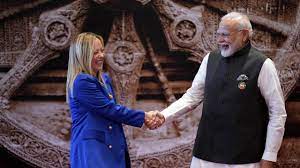
The Landscape of International Relations Presents New Initiatives and Alliances Aimed at Promoting Collaboration and Global Development
Europe and the United States promote a new coalition of nations and organizations, united to promote technological innovation and economic cooperation. This initiative has recently gained notoriety thanks to the agreement on the “Cotton Road,” an ambitious project connecting India, the Middle East and Europe. The agreement signed by Italian Prime Minister Giorgia Meloni in New Delhi, on the occasion of the G20, has drawn the attention of the whole world to a new memorandum of understanding for an India-Middle East-Europe corridor (IMEC) and which involved leaders of nations such as the United States, India, Saudi Arabia, the United Arab Emirates, France, Germany and the European Union. This is a far-reaching agreement that includes rail and port connections, data transmission, and new green energy infrastructure.
The “Cotton Road,” as called by some, is a key part of the IMEC corridor and is a project that aims to connect Europe and the Gulf, via the United Arab Emirates, Saudi Arabia, Israel and Jordan, via a rail link and a port between India and the Gulf. This infrastructure aims to significantly reduce the time it takes to transport goods between India and the Middle East, bringing economic benefits and promoting stability in a region often plagued by turbulence.
The strategic importance of this project cannot be underestimated and is expected to reduce freight transportation times between India and the Middle East by up to 40%, according to Ursula Von der Leyen, President of the European Commission. In addition to the economic aspects, the “Cotton Road” aims to enhance energy cooperation between the signatory countries, promoting sustainable development and greater energy independence. The IMEC agreement and the “Cotton Road” have attracted mixed reactions internationally. While the United States, India, and other involved nations have welcomed this step toward economic collaboration and innovation, China has shown some hostility. The Global Times, China’s state newspaper, criticized the United States as “copycats” and suggested it should focus on improving national infrastructure.
However, IMEC and the “Cotton Road” represent a concrete response to the challenges presented by the Chinese Silk Road. This new initiative aims to diversify trading options and promote greater independence from a single trade route. Europe and other involved nations recognize the importance of responding to the growing demand for infrastructure in the Global South, avoiding Beijing filling a potential void. IMEC and the “Cotton Road” represent an example of how international collaboration can address global challenges and promote sustainable development. This ambitious project will not only reduce transportation times for goods, but will also help strengthen ties between nations, promoting stability and prosperity.
Italy, with its privileged geographical position in the Mediterranean, could play a key role in this initiative. The IMEC corridor could become one of the central points of the agenda of the next G7, chaired by Italy, as it promotes economic growth in Southern Europe and represents an opportunity to strengthen Italy’s influence in the European Union. Ultimately, IMEC and the “Cotton Way” are testament to the potential of international collaboration to address global challenges and promote sustainable economic development. This project represents an alternative route to China’s Silk Road and could shape the future of international economic relations. Policy continuity towards the Indo-Pacific and collaboration between nations are essential to the success of such initiatives, regardless of global political changes. Of all the international initiatives aimed at competing with China’s trading power, this appears to be the most aggressive and potentially effective.
Alessandro Fiorentino



 Subscribe
Subscribe